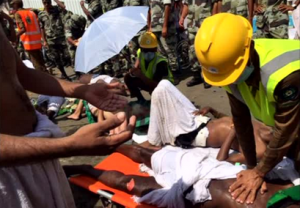
(Reuters) — At least 220 pilgrims were killed on Thursday in a crush at Mina, outside the Muslim holy city of Mecca, where some two million people are performing the annual haj pilgrimage, Saudi Arabia’s civil defense authority said.
At least 450 others were injured in the crush, which took place on Street 204 of the camp city at Mina, a few kilometers east of Mecca, where pilgrims stay for several days during the climax of the haj.
The pilgrimage, the world’s largest annual gathering of people, has been the scene of deadly disasters in the past, including stampedes, tent fires and riots.
The last major incident in haj took place in 2006, when at least 346 pilgrims were killed as they attempted to perform the stoning of the devil at Jamarat.
However, massive infrastructure upgrades and extensive spending on crowd control technology over the past two decades had made such events far less common.
Street 204 is one of the two main arteries leading through the camp at Mina to Jamarat, where pilgrims ritually stone the devil by hurling pebbles at three large pillars.
Reuters reporters in another part of Mina said they could hear police and ambulance sirens, but that roads leading to the site of the disaster had been blocked to prevent a further crowds developing.
Photographs published on the civil defense Twitter feed showed pilgrims lying on stretchers while emergency workers in high-visibility jackets lifted them into an ambulance.
It said more than 220 ambulances and 4,000 rescue workers had been sent to the stampede’s location to help the wounded. Saudi-owned Al-Arabiya television channel showed a convoy of ambulances driving through the Mina camp.
“Work is underway to separate large groups of people and direct pilgrims to alternative routes,” the Saudi Civil Defense said on its Twitter account.
Thursday is also Eid al-Adha, when Muslims slaughter a sheep. It has traditionally been the most dangerous day of haj because vast numbers of pilgrims attempt to perform rituals at the same time in a single location.
Two weeks ago 110 people died in Mecca’s Grand Mosque when a crane working on an expansion project collapsed during a storm and toppled off the roof into the main courtyard, crushing pilgrims underneath.
Such disasters are politically sensitive for the kingdom’s ruling Al Saud dynasty, which presents itself internationally as the guardians of orthodox Islam and custodians of its holiest places in Mecca and Medina.
King Salman, like his predecessors, is officially styled “Custodian of the Two Holy Mosques”.
(Reporting by Nidal al-Mughrabi; Writing by Sami Aboudi and Angus McDowall; Editing byDominic Evans)







